Please use this identifier to cite or link to this item:
https://cris.library.msu.ac.zw//handle/11408/448| Title: | Crisis of communal leadership: post-colonial local government reform and administrative conflict with traditional authorities in the communal areas of Zimbabwe, 1980-2008 | Authors: | Ncube, Godfrey Tabona | Keywords: | Traditional leaders, communal areas, village develop ment committees, | Issue Date: | Jul-2011 | Publisher: | Academic Journals | Series/Report no.: | African Journal of History and Culture;Vol. 3(6) | Abstract: | Rural local government reform measures adopted by the new Government of Zimbabwe at independence in 1980 were largely inspired by the state's modernization initiatives and the need to create a framework for expanded delivery of services to the peasant communities in order to redress the imbalances of colonial neglect. However, the reform measures also sought to undermine the authority of traditional institutions in judicial and land matters in the communal areas; firstly because of their perceived pre-independence role as functionaries of colonial oppression; secondly, because some elements within the new Government viewed traditional institutions as antithetical to their modernization project to transform rural society; and thirdly because other elements in the new Government perceived traditional institutions as centers of alternative authority to that of the formal state. The failure by the new Government to incorporate and co-opt traditional institutions into formal state institutions in the first two decades of independence lies at the heart of the confusion surrounding land administration in the communal areas after independence. This confusion at the local administrative levels was characterized by a lack of clarity on roles and functions between the traditional institutions of chief, headman and village head, and the elected leadership of village development committees (VIDCOs) and ward development committees (WADCOs) in land matters. It precipitated a crisis of communal leadership in the communal areas of Zimbabwe, whereby, on one hand, elected rural institutions had little real legitimacy according to traditional grassroots perspectives, while traditional leaders were not always acknowledged or respected by the formal state's modernization initiatives. However, in many areas of the country, chiefs, headmen and village-heads illegally reacquired some of their defunct authority over land and proceeded to clandestinely allocate land. This crisis of communal leadership manifested itself in many land dispute cases that occurred at district level throughout the country for more than two decades, where there was clear evidence of hostility between the new and the old land administration structures. | URI: | http://hdl.handle.net/11408/448 | ISSN: | 2141-6672 |
| Appears in Collections: | Research Papers |
Files in This Item:
| File | Description | Size | Format | |
|---|---|---|---|---|
| Ncube tabona.pdf | 77.25 kB | Adobe PDF |  View/Open |
Page view(s)
170
checked on Feb 10, 2026
Download(s)
34
checked on Feb 10, 2026
Google ScholarTM
Check
Items in MSUIR are protected by copyright, with all rights reserved, unless otherwise indicated.



